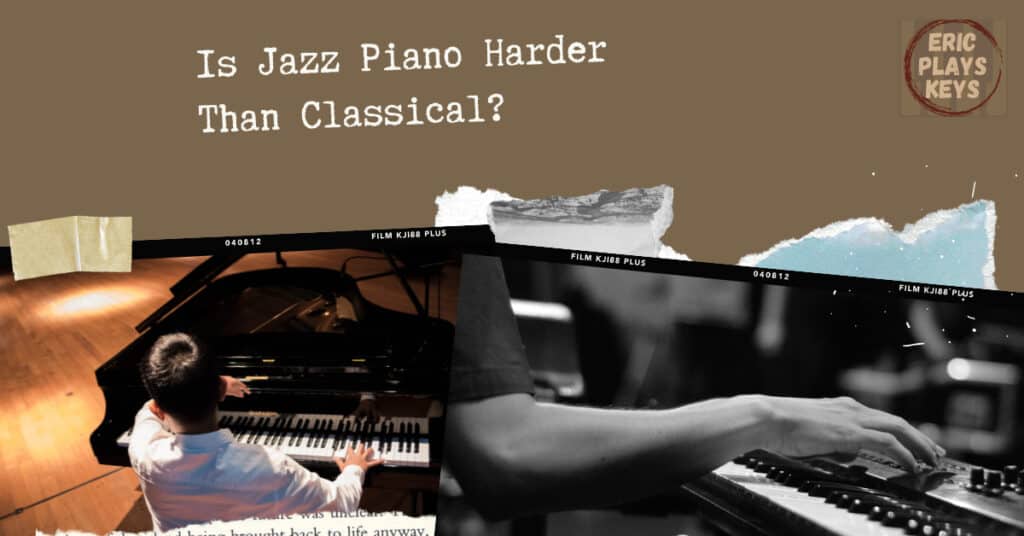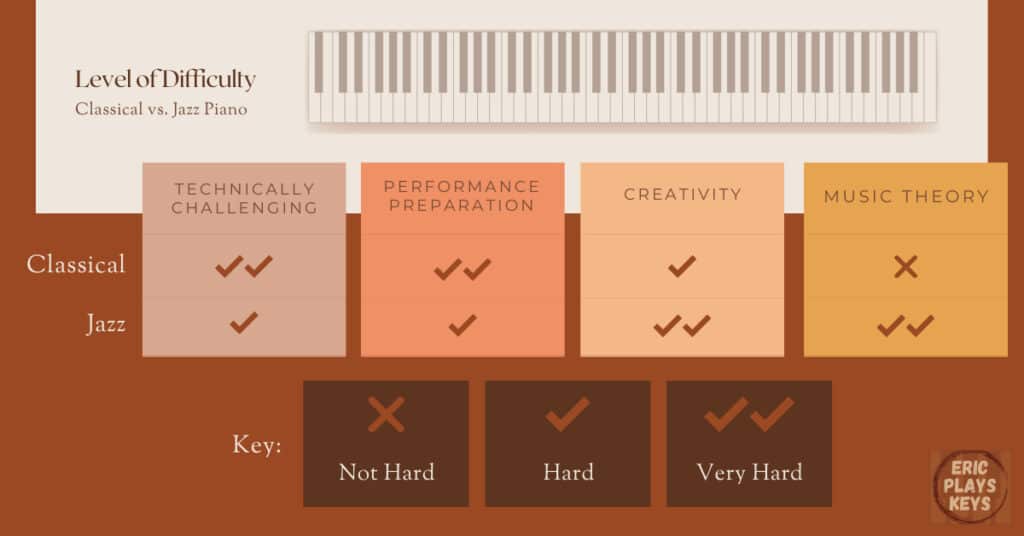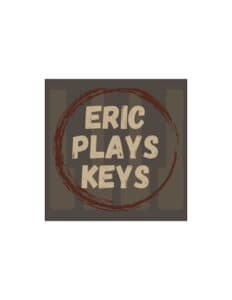
I’ve been a student and performer of both jazz and classical piano for 20 years, and I’ve experienced the unique challenges within both genres. It’s very common for musicians to be curious about what they’re getting themselves into when taking on the challenge of learning jazz or classical piano, so I’ve summarized the key differences as a guide.
Jazz piano is harder for musicians who prefer explicit guidelines, and classical piano is harder for musicians who prefer more creative freedom. This is because jazz requires improvisation and generation of unique musical ideas, while classical music requires conformation to predetermined pieces.
So what exactly are the differences between rules and guidelines in jazz and classical music? And how does this translate into which genre is more difficult? This article will take a deep dive comparing and contrasting the two genres.
What Aspects of Jazz Are Harder Than Classical, and Vice Versa?

Technically challenging – this one goes to classical without a doubt. Classical music is notoriously hard to play, and some classical pieces can take years to learn and perfect. Professional pianists in the classical genre often practice many hours a day, and have been consistently doing this for their entire lives. In fact, there’s classical pieces called etudes that are purposefully written to be technically challenging. Jazz can be technically challenging as well – but it’s very uncommon to hear a jazz pianist plays a passage that compares in difficulty to the hardest classical pieces. Classical pieces can have complex passages being played by the right hand and left hand at the same time, sometimes with multiple voices in each hand (pieces using this technique are commonly called ‘Fugues’). Since jazz is improvised, it’s not really feasible to come up with multiple concurrent passages like that at the same time (with some rare exceptions – see Brad Mehldau). Classical composers and pianists have time to plan and prepare for technically different moments, but a jazz pianist is limited to whatever they can pull off in the moment. If you’re concerned about the difficulties of learning to play, check out this article.
Preparing for a performance – this category goes to classical as well. As said before, it can take years to learn just one difficult classical piece. Meanwhile in jazz, musicians can show up to jam sessions, call a tune, and everyone can pull off a performance right then and there. This doesn’t mean it’s easy to learn tunes – jazz musicians have to put in a lot of work to learn theory, jazz language, and memorize the tunes. However, once a jazz musician has learned the common progressions and how to solo and accompany them, learning new jazz tunes becomes relatively straightforward. I did a concert a couple years ago in which I played a jazz set, and one classical piece in the middle. I had to spend months practicing to pull that piece off, and to be honest I still made some serious mistakes. I practiced for the rest of the jazz set as well, but since I’ve been immersed in jazz and improvisation for so many years, I can play a set of jazz standards and songs with minimal to no preparation.
Creativity – I’m giving it to jazz (note – this is my personal opinion). It’s not that classical music doesn’t require creativity to phrase and bring the piece to life – my argument is more that jazz still requires phrasing, artistic choices, bringing music to life, as well as the fact that when you improvise you have to make up the notes as well. Jazz musicians also must come up with their own intros and outros, forms, and arrangements, usually without much official guidance on how to do so. In other words, a jazz musician is responsible for creating musicality just as much as a classical musician, and is also in charge of coming up with the musical content itself! This article goes into more detail on how to improve your creativity as a musician in any genre of music.
Theory – this one definitely goes to jazz. To improvise, the musician must have a deep understanding of the chord progressions, notes that belong to each chord, jazz conventions and language that belong to chords, and must be able to creatively apply this knowledge to synthesize new language in real time. In classical music, although music theory is taught and encouraged, it’s not technically a requirement for musicians who aren’t composers. The one exception to this is the ability to read sheet music – it would be extraordinarily difficult to learn to play classical music without this skill since every piece is notated this way. If you’re wondering whether you’d be interested in learning music theory, check out this article.
Is Jazz Music or Classical Music More Complex?
Jazz is complex because of real-time decision making during improvisation, while classical is complex because of the difficult technical demands. Both genres can range from relatively simple to very complex, depending on the song, composer, and performer.
During improvisation, jazz musicians have to account for rhythm, chord changes, phrasing, the other musicians in the group, and still come up with musical ideas on the spot. In my experience, after many years of practice, a lot of these factors become instinctive. However, there’s still a lot of information that can be analyzed and taken apart in any jazz solo. Classical pieces, compared to most jazz songs, usually have more notes packed in, more advanced compositional techniques, and more specific phrasing concepts. Again, these characteristics vary widely between songs and pieces, but in my experience these are the general trends.
How To Choose Between Learning Jazz and Classical Music
Students should consider their desire for creative freedom, need for structure, interest in music theory, and music taste when choosing to learn jazz or classical music. Jazz is creative, free, and can apply to popular music, while classical is regimented, structured, considered more sophisticated, and niche.
My first recommendation is to try both for a few years and discover which genre resonates with you more. My second recommendation, assuming the student does not want to try both for years, is to learn jazz and skip the classical music training. I studied classical music from age 5 to 18 – I got a lot out of it but decided to focus more on jazz because I enjoy being creative and playing other genres of music. On the other hand, classical music can be very impressive and perfecting a difficult piece is very rewarding. In addition, when first starting out, there’s less of a learning curve for classical music because the notes to play are figured out for you. There’s no clear cut answer on this one – I strongly recommend trying both and following your heart. However, I believe learning jazz music is more practically useful in the long run.
Are Jazz Pianists Classically Trained?
Jazz pianists usually do not have a formal classical training background, although there are some exceptions. Brad Mehldau’s music has a significant classical influence, while Thelonius Monk never even attended music school.
That being said, it’s hard to define what a classical training background is. For example, it’s said that Thelonius Monk did actually spend some time learning classical music, which may count as training for some people but not others. Either way, the amount of classical training is really dependent on the musician, but by no means is a requirement for progression in jazz.
Personally, my formal classical education has really helped me play jazz, in that I learned good technique, work ethic, music theory basics, phrasing, and I gained a lot of experience practicing and performing. I know several jazz pianists that were not classically trained the sometimes struggle with their technique – it’s possible that classical training could have alleviated some of these difficulties (or not – it’s hard to know for sure). I do get compliments on my technique from jazz musicians though – they can tell I learned classical music and appreciate how it translates into my jazz playing.
